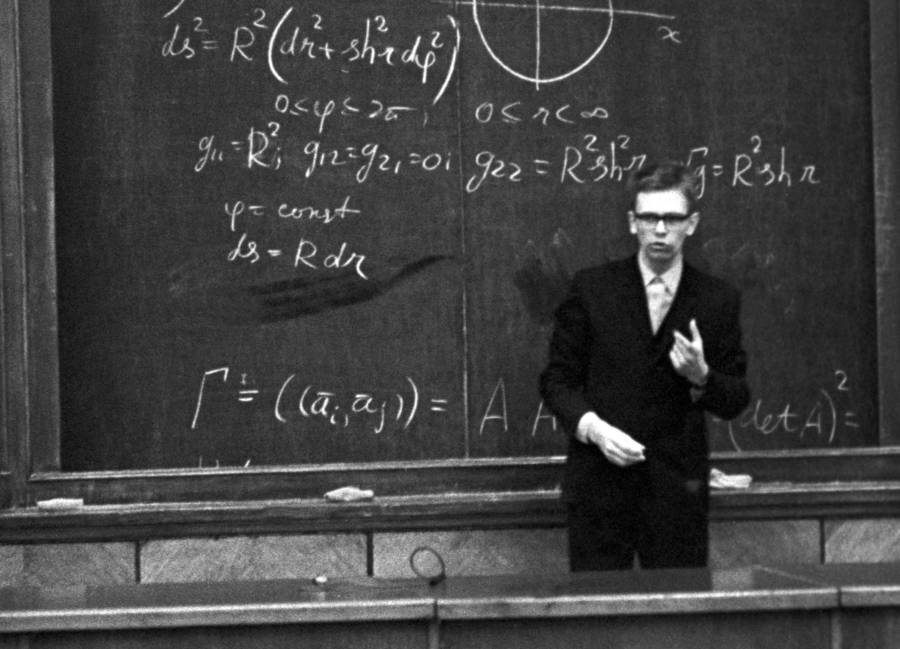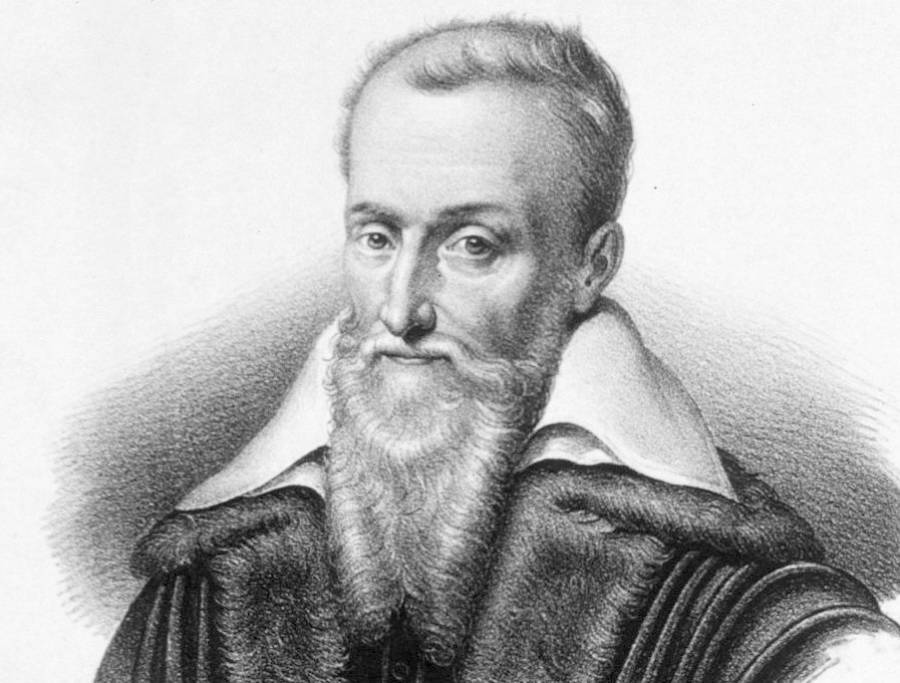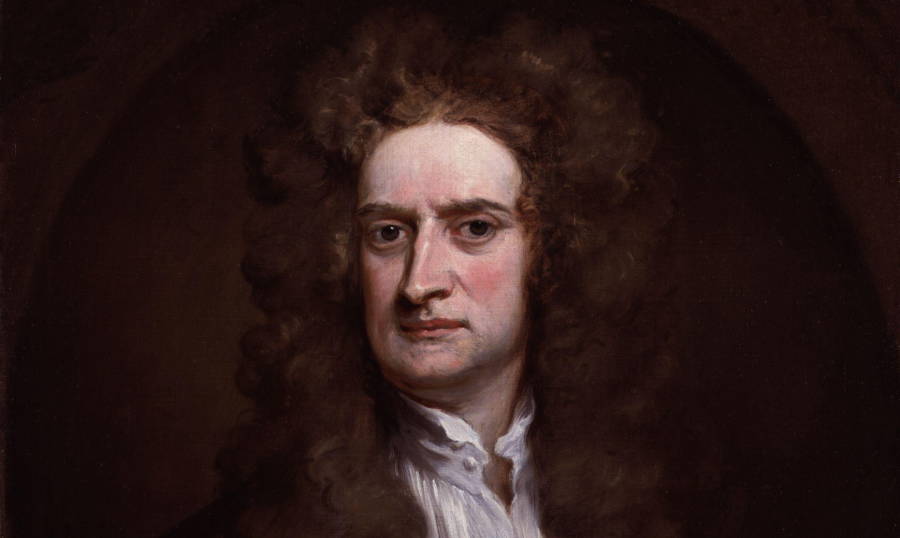According to Anatoly Fomenko's New Chronology, history as we know it was fabricated by Christian scholars. Discover why he believes it and why he's not 100 percent crazy.

Valentin Kuzmin/TASS/Getty ImagesAnatoly Fomenko delivers a lecture to students of Lomonosov Moscow State University. 1972.
Almost everything you thought you knew about history is wrong. The Roman Empire emerged in the late Middle Ages, not the eighth century B.C. In fact, Ancient Rome, Greece, and Egypt as we know them didn’t exist at all. And Jesus lived and died in the 12th century A.D.
Or so says the New Chronology theory developed by Russian mathematician Anatoly Fomenko.
Since the 1970s, Fomenko (born in 1945) has been building, refining, and publishing his ideas claiming that the history we all know to be true has been largely fabricated, that centuries upon centuries’ worth of history was either faked by devious scribes or wildly misinterpreted by scholars (a theory not unlike the infamous Phantom Time Hypothesis).
While the finer points of the Fomenko theory are as convoluted and confusing as you might expect, the guiding principle is that recorded history before the 11th-14th centuries is generally unreliable for various reasons. Virtually all extant documents from the period before that time, Fomenko writes, are untrustworthy, due to a number of factors: poor timekeeping devices, inconsistent record-keeping, limited availability of surviving documents, lack of movable type, and so on.
Moreover, Fomenko argues, pre-Renaissance history was largely fabricated by a number of writers, most of whom did so at the behest of the Catholic Church and other Christian leaders of the time so that they could present historical “evidence” to back up claims made in the Bible.

Wikimedia CommonsJoseph Scaliger
Along these lines, Fomenko specifically focuses on the writings of 16th-century French Christian scholar Joseph Scaliger. According to Fomenko, Scaliger ranks among the leading historians of the time who helped forge and propagate the “false” record of pre-Rennaisance history that persists to this day.
And if historians weren’t being outright devious like Scaliger, then they were being devious in a more lazy way, Fomenko claims. That is, Renaissance scholars would simply invent ancient history based on contemporary people and events in order to create a “phantom” history, as he calls it.
For example, Fomenko believes that most Eurasian history between the third and 11th centuries A.D. was concocted by historians of the 13th-17th centuries A.D. who created a false record of those prior centuries by filling that record with variations of events that were happening during the 13th-17th centuries.
A similar thing happened with the Bible, Fomenko claims. He writes that the Bible we know today is largely built on 11th-14th-century fabrications and revisions to older texts and that these fabrications and revisions actually reflect events that were happening in the 11th-14th centuries.
So, Fomenko theorizes that the Babylonian captivity described in the Bible (in which in the Jews of the Kingdom of Judah were invaded by Babylon and held captive there for 70 years in the sixth century B.C.) is actually a false history inspired by the nearly 70-year Avignon Papacy period in which seven popes resided in Avignon, France as opposed to Rome due to pressure from the French monarchy.
Why exactly Fomenko argues all of this and how he attempts to prove these claims is another matter entirely.
Apart from his creation of the New Chronology, Fomenko is a notable mathematician who has earned his doctorate, taught at Moscow State Lomonosov University, become a member of the Russian Academy of Sciences, won a State Prize of the Russian Federation for mathematics, and published some 250 works.
It’s this background in mathematics that helps explain how Fomenko began building the New Chronology. In 1973, he began reading other writers’ work about inconsistencies in historical data related to lunar cycles. When he began digging into such data himself, he concluded that many lunar eclipses and other celestial events could not have occurred when historians said they did and thus major historical lynchpins could be off by hundreds of years.
His calculations, which have since been criticized by other writers, showed that certain celestial events that were said to have occurred in the time of Jesus had to have actually occurred some 1,000 years later.

Wikimedia CommonsIsaac Newton
From there, Fomenko had help in building his New Chronology thanks to several centuries’ worth of other writers (including Jean Hardouin of 17th-century France, Nikolai Morozov of 19th-century Russia, and even Isaac Newton) who’d long been claiming that Christian scholars in the Middle Ages had misrecorded history either mistakenly or deviously.
Fomenko picked up these ideas, added in a host of dubious mathematical calculations related to the astronomical record, and so the New Chronology was born. In the decades since, Fomenko has published many volumes on the subject, although his only visibility outside of Russia is largely confined to the corners of the internet that feed on fringe theories.
In fact, Fomenko’s ideas haven’t even received enough attention to warrant much rebuttal from the scientific community. Perhaps it’s not worth refuting a theory that so obviously flies in the face of mountains of archaeological evidence, written records, carbon-dated artifacts, and on and on.
Nevertheless, as misguided as Fomenko’s claims are, there’s a kernel of truth at the center. History — and this becomes truer and truer the further back you go — is always a reconstruction to some extent.
As Fomenko wrote, “When we say that Brutus killed Caesar with a sword, the only thing it means is that some written source that managed to reach our time says so, and nothing but! The issue of just how faithfully documented history reflects real events is very complex and requires a special study.”
He’s right, it’s just probably not his kind of special study that we needed.
After this look at Anatoly Fomenko and the New Chronology, read up on other bizarre fringe theories including the Paul is dead rumor popular among some Beatles fans as well as the belief that the moon landing was faked.




